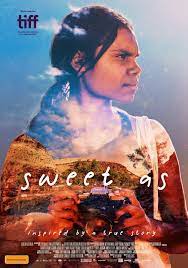
SWEET AS
Australia, 2022, 87 minutes, Colour.
Shantae Barnes-Cowan, Tasma Walton, Carlos Sanson, Mark Coles Smith, Ngaire Pigram, Pedrea Jackson, Mikayla Levy, Andrew Wallace.
Directed by Jub Clerc.
For Australian audiences, as well as overseas audiences, this film is an invitation to explore Western Australia, Pilbara country. And we are invited to share the experience with four troubled teenagers who go on an organised safari with two supervisors, an opportunity for them to get away from their surroundings, face some of their own problems. But, the key is for each of the four to have a camera, to take photos of their choice, creating stories with their photos, coming to some kind of self-appreciation and self-understanding.
The central youngster in this story is Murra, played attractively and more than competently by Shantae Barnes-Cowan who has already shown a talent for acting in film and television. She is at school. She indulges in some shoplifting. Her mother, a drinker, is highly critical of her and some of the drinkers in the house tried to molest her. Fortunately, she has a sympathetic uncle, a local policeman, Ian, played by the ever-reliable Mark Coles Smith. It is he who gets her a place on the minibus for the camera safari. She is joined by three other youngsters, Sean, pale and thin, depressed and sometimes feeling suicidal; Elvis, aboriginal boy who suffered the trauma of being beaten up but still has a lively personality; Kylie, white girl, dominated by an adult white male, surly. But, the chaperones on the trip are very sympathetic, Tasma Walton is a no-nonsense driver and advisor, Carlos Sanson Jr is the photography expert (explaining himself as Fernando, Nando, exiled from Nicaragua with his photographer mother and academic father, Carlos Sanson Jr coming from Sydney but with Cuban-Chilean background).
Dramatically, there are not too many surprises along the way. But, that is not the point. The point is to look at the portrait of the four, sense their inadequacies, see their limitations, even in relating to each other, the false steps they take, the clashes, their being left to fend for themselves in the bush, the responding to some crises, and the photographs.
Murra finds that photography is one of her talents, carefully choosing pictures, and the audience seeing the title at the side of each photo she takes. She is on country and we observe country through her eyes, the extraordinary beauty of the rock formations, the water holes and waterfalls…
So, on the whole, this is a sweet film, not a dramatic blockbuster! There is a great sense of humanity. And, in the year of the referendum and The Voice, a visit to indigenous families, hardships, violence, drinking, family neglect – no privileges there. The Voice is an appeal to better First Nations conditions.
- The title, the tone? In relationship to the central characters? The safari, photography?
- The location photography, the Pilbara, the towns, houses, the open roads, the mines, the trains, the beauty of nature, the rock formations, red colour, water holes, waterfalls…? The musical score?
- The introduction to Murra, aboriginal girl, age, experience school, the shoplifting scene, home life, barring the door, her mother and drinking, her mother neglecting her, the visitors, the attempt to molest her, her mother’s reaction, Murra going to her uncle, her uncle the policeman, concern, handcuffing the mother, the uncle taking Mara for the safari? Her unwillingness?
- The safari in the organisation, Mitch, strong personality, interactions with the youngsters, with Nando, driving, discipline, sympathy? Nando, the Nicaraguan background, his parents, photography, his skills, friendliness? The supervision, chaperones?
- The four youngsters, Murra and her keeping apart, Sean, thin, white, his mother and family, their concern, his revealing that he felt suicidal? Kylie, with the adult man, the phone, his demands that she contact him, her surly attitudes? Elvis, family, cheerful?
- A road film, the variety of locations, in the town, the large ships and the port, the hills and chemicals, the open road?
- The interactions amongst the four, their being given the cameras, their skills and lack of skills in photography, Nando urging them to photograph choices, giving the photos titles, Murra and her stories with the photos? The photographing each other? The two girls, tensions, black and white, different kinds of surliness? The two boys, Elvis and his liveliness, Sean withdrawn? The motel, Murra getting the drink, the four drinking, the men and their approaches? Mitch and Nando and bringing the group back?
- Out in the country, pitching the tents, rivalries, clashes? The walks out in the countryside, the beauty of the countryside, Murra, going into the water, the seductive eye toward Nando, his reaction? Losing Sean? Everybody searching for him, Murra retracing the steps, finding him on the edge of the cliff, throwing the torch over, bringing him back?
- Each of the group telling their stories, their problems, self-understanding, self-deprecation?
- Their being left to themselves, Elvis and the hunting, the scrub turkey, the meal, Murra explaining the berries…? The bonding?
- The return home, the effect of the safari, the photos, the family is waiting for them, Kylie asserting herself against the man, Murra and the reconciliation with her mother, the support of her uncle, Sean and his family, Elvis and his family?
- The coming-of-age themes, problem children, facing issues, photography therapy, the results?
- The cinema contribution to indigenous stories?